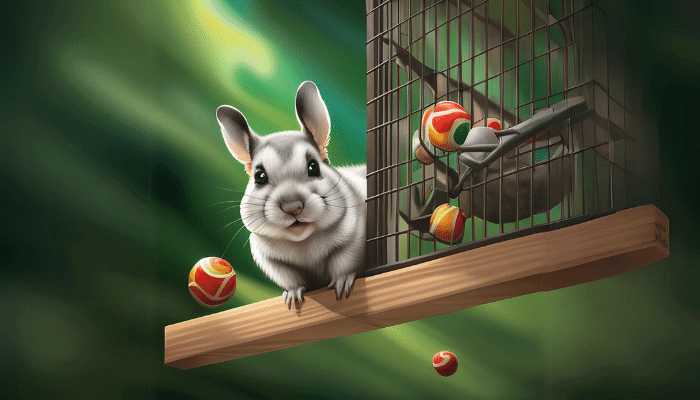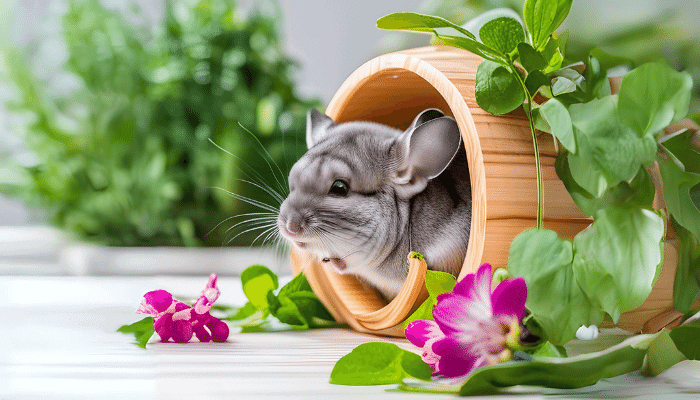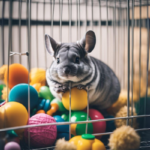Chinchillas, with their soft fur, bright eyes, and playful personalities, are captivating companions. But beyond their cuteness lies a surprising intelligence that, with Chinchilla Training, can be unlocked to create a deeper bond and enrich your lives together.
What is Chinchilla Training?

Unlike training a dog or cat, Chinchilla Training focuses on positive reinforcement and gentle guidance. It’s about building trust and understanding, not dominance. You can teach your chinchilla basic commands, desirable behaviours, and fun tricks through consistent, reward-based interactions.
Benefits of Chinchilla Training
Improved Communication: Training strengthens the bond between you and your chinchilla, allowing you to better understand each other’s needs and signals.
Reduced Stress and Anxiety: Predictable routines and learned behaviors can help reduce stress for your chinchilla, leading to a happier and healthier life.
Enhanced Enrichment: Learning new skills keeps your chinchilla mentally stimulated and prevents boredom, which can lead to destructive behaviou.
Boosted Confidence: Mastering tricks and commands can boost your chinchilla’s self-esteem and make them feel more comfortable in their environment.
Pro Tip: Observe your chinchilla’s body language for clues on their mood and needs.
Creating a Chinchilla Friendly Environment

Before going into training, it’s vital to create a conducive environment for your chinchilla. A happy chinchilla is more receptive to training, making the process smoother and more enjoyable for both you and your furry friend.
The Ideal Cage Setup
Chinchillas need spacious cages with platforms, ledges, and a dust bath for their grooming rituals. Providing a comfortable and stimulating environment ensures a well-adjusted chinchilla ready for training sessions.
Lighting and Temperature Considerations
Maintaining a consistent environment with proper lighting and temperature is essential for chinchillas. These factors influence their behaviour and overall well-being, influencing the success of your Chinchilla Training.
Pro Tip: Use soft bedding and provide a few favourite treats to create a positive association.
Basic Chinchilla Commands

Now that the stage is set, let’s delve into the fundamental commands that form the core of Chinchilla Training.
Come Here, Furry Friend
To train your chinchilla to come when called, employ positive reinforcement by offering enticing treats each time you use the command. Consistency is key; repeat the process regularly in a quiet, secure environment. This fosters a positive association, making the training both delightful and effective for your furry friend.
Pro Tip: Keep sessions short and end on a positive note to maintain your chinchilla’s interest.
Gentle Handling
Chinchillas are known for their delicate bone structure. Train them to tolerate gentle handling from an early age to ensure stress-free interactions
Pro Tip: Always monitor interactions and provide a safe space for your chinchilla to retreat.
Introducing Fun Tricks
Surprise your friends with your chinchilla’s talents. Teach them tricks like standing on their hind legs or rolling a tiny ball.
Pro Tip: Use a clicker to reinforce good behavior and associate it with treats.
Stay and Play
Establish a safe zone for your chinchilla by teaching them to stay put. Patience and consistency are paramount. Use treats to reinforce good behaviour, rewarding them for remaining in the designated area. Gently guide them back if they stray, ensuring their safety while fostering a secure and positive environment for play.
Addressing Common Training Challenges

Chinchilla training can present challenges, but with patience and the right approach, overcoming them is entirely achievable.
Dealing with Chewing Habits
Chinchillas have an instinct to chew, and this can sometimes lead to unwanted behaviour. Provide appropriate chew toys. Chinchillas by offering suitable chew toys, satisfying their instinct. Redirect their attention when they engage in less desirable chewing on items like furniture or wires. Consistent reinforcement of positive chewing behaviour helps maintain their dental health and prevents destructive habits.
Handling Aggression
Address aggression in chinchillas by understanding its triggers. Assess their environment for stressors and gradually desensitize them through positive interactions. Establish trust by moving at their pace, providing treats, and creating a calm atmosphere. Identifying and addressing root causes helps foster a more secure and amicable relationship over time.
Overcoming Shyness
Some chinchillas may be naturally shy or anxious. Help shy chinchillas overcome anxiety by creating a tranquil setting. Spend dedicated, gentle time with them, offering treats and positive reinforcement. Gradually introduce them to new experiences to build confidence. Patience and consistent positive interactions create a secure environment, encouraging a shy chinchilla to become more sociable and at ease over time.
Conclusion
In this guide, we’ve covered the basics, advanced tricks, and common concerns about chinchilla training. In the realm of Chinchilla Training, patience, consistency, and a deep understanding of your pet’s needs are your greatest allies. Through positive reinforcement and a genuine connection, you can mould your chinchilla into a well-behaved companion, fostering a bond that transcends the traditional pet-owner relationship.
Remember, every chinchilla is unique, so tailor your training approach to suit their personality. As you embark on this journey, celebrate small victories, and relish the joy of witnessing your chinchilla blossom into a happy and well-behaved member of your family.
FAQs

Let’s address some frequently asked questions about Chinchilla Training to ensure a smooth journey for both you and your furry friend.
Can Chinchillas Learn Tricks?
Absolutely! Chinchillas are intelligent and can learn tricks with patience and positive reinforcement. Start with simple commands and gradually progress to more complex tricks.
How Long Does Chinchilla Training Take?
The duration varies, but consistency is key. Basic commands may take a few weeks, while more complex behaviors could take a few months. Tailor the training pace to your chinchilla’s comfort level.
Is it Possible to Train an Older Chinchilla?
Yes, it is! While younger chinchillas may learn faster, older ones can still be trained with patience and positive reinforcement. Adjust your approach to suit their individual needs.
What Treats Are Best for Chinchilla Training?
Chinchillas have sensitive digestive systems, so opt for treats specifically designed for them. Pellets or small pieces of hay-based treats work well as rewards during training.
Can Chinchillas Be Potty Trained?
Yes, chinchillas can be potty trained to an extent. Provide a designated corner with a litter box and reward good behavior.
Are Chinchillas Affectionate?
Chinchillas can be affectionate, but each has a unique personality. Be patient and let your chinchilla initiate contact.
How Do I Stop Excessive Chinchilla Vocalization?
Chinchillas vocalize to communicate, but excessive noise may be due to stress or boredom. Ensure their environment is enriched with toys and activities, and monitor for any signs of distress.










